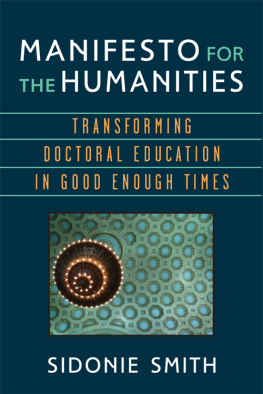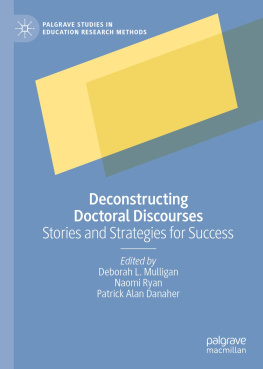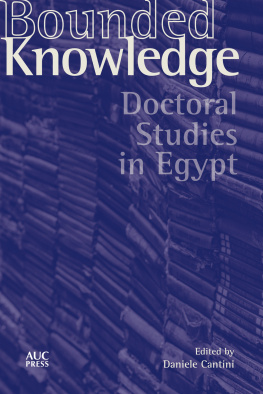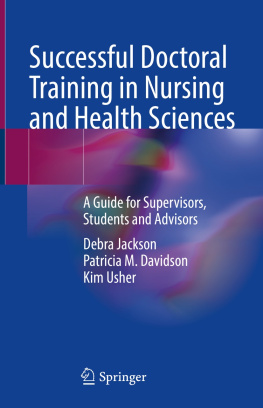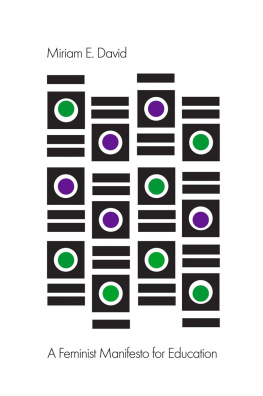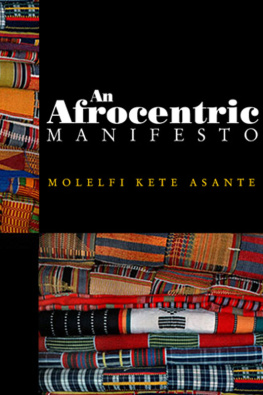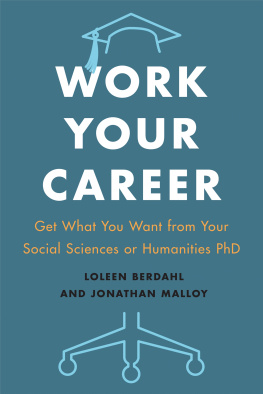Sidonie Smith - Manifesto for the Humanities: Transforming Doctoral Education in Good Enough Times
Here you can read online Sidonie Smith - Manifesto for the Humanities: Transforming Doctoral Education in Good Enough Times full text of the book (entire story) in english for free. Download pdf and epub, get meaning, cover and reviews about this ebook. year: 2018, publisher: University of Michigan Press, genre: Politics. Description of the work, (preface) as well as reviews are available. Best literature library LitArk.com created for fans of good reading and offers a wide selection of genres:
Romance novel
Science fiction
Adventure
Detective
Science
History
Home and family
Prose
Art
Politics
Computer
Non-fiction
Religion
Business
Children
Humor
Choose a favorite category and find really read worthwhile books. Enjoy immersion in the world of imagination, feel the emotions of the characters or learn something new for yourself, make an fascinating discovery.
- Book:Manifesto for the Humanities: Transforming Doctoral Education in Good Enough Times
- Author:
- Publisher:University of Michigan Press
- Genre:
- Year:2018
- Rating:4 / 5
- Favourites:Add to favourites
- Your mark:
- 80
- 1
- 2
- 3
- 4
- 5
Manifesto for the Humanities: Transforming Doctoral Education in Good Enough Times: summary, description and annotation
We offer to read an annotation, description, summary or preface (depends on what the author of the book "Manifesto for the Humanities: Transforming Doctoral Education in Good Enough Times" wrote himself). If you haven't found the necessary information about the book — write in the comments, we will try to find it.
Sidonie Smith: author's other books
Who wrote Manifesto for the Humanities: Transforming Doctoral Education in Good Enough Times? Find out the surname, the name of the author of the book and a list of all author's works by series.
Manifesto for the Humanities: Transforming Doctoral Education in Good Enough Times — read online for free the complete book (whole text) full work
Below is the text of the book, divided by pages. System saving the place of the last page read, allows you to conveniently read the book "Manifesto for the Humanities: Transforming Doctoral Education in Good Enough Times" online for free, without having to search again every time where you left off. Put a bookmark, and you can go to the page where you finished reading at any time.
Font size:
Interval:
Bookmark:
 Page i
Page i 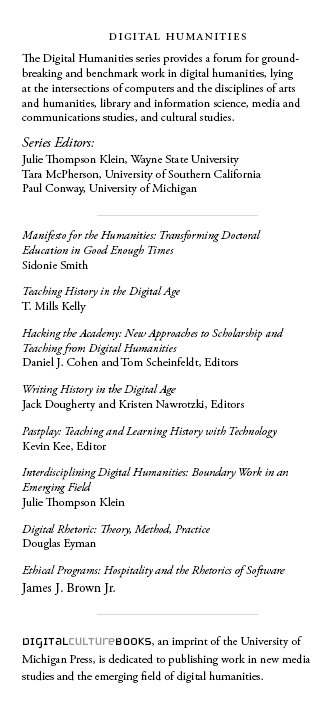 Page ii Page iii
Page ii Page iii in Good Enough Times
Sidonie Smith
University of Michigan Press
Ann Arbor
Page iv Copyright by Sidonie Smith 2016
Some rights reserved

This work is licensed under the Creative Commons Attribution-Noncommercial-No Derivative Works 3.0 United States License. To view a copy of this license, visit http://creativecommons.org/licenses/by-nc-nd/3.0/ or send a letter to Creative Commons, 171 Second Street, Suite 300, San Francisco, California, 94105, USA.
Published in the United States of America by the
University of Michigan Press
Manufactured in the United States of America
2018 2017 2016 2015 4 3 2 1
A CIP catalog record for this book is available from the British Library.
DOI: http://dx.doi.org/10.3998/dcbooks.13607059.0001.001
Names: Smith, Sidonie, author.
Title: Manifesto for the humanities : transforming doctoral education in good
enough times / Sidonie Smith.
Description: Ann Arbor : University of Michigan Press, 2015. | Includes
bibliographical references and index.
Identifiers: LCCN 2015040301| ISBN 9780472073047 (hardcover : alk. paper) |
ISBN 9780472053049 (pbk. : alk. paper) | ISBN 9780472121717 (ebook)
Subjects: LCSH: Doctor of philosophy degree. | Universities and
collegesGraduate work. | HumanitiesStudy and teaching. | Educational
change.
Classification: LCC LB2386 .S648 2015 | DDC 378.2dc23
LC record available at http://lccn.loc.gov/2015040301
To Roger Salomon, my revered dissertation advisor
What ended up as this long manifesto (perhaps an oxymoronic phrase) began as two short newsletter columns written in 2010 when I served as president of the Modern Language Association. Having watched so many doctoral students struggle through writing a proto-monograph dissertation, I thought, why not reimagine this capstone to doctoral study. That task, of making a case for expanding the repertoire of forms the dissertation might take, became the impetus for understanding what a 21st-century doctoral education in the humanities might look like. Over five years, Ive been consumed with this question. But it has not been a lonely task. In fact, it has been a densely peopled, sociable, interactive, collaborative experience for me. And so, there are many thanks to spread around.
Over the years, MLA staff have given me invaluable advice, information, and support as I pursued this project on doctoral education. Executive Director Rosemary Feal exercises her leadership role with unflagging energy and enthusiasm. I was the beneficiary of her advocacy skills and her ability to flow with the criticism and with the opportunities for collaboration. David Laurence, Nelly Furman, Doug Steward, and Kathleen Fitzpatrick have always been willing to share their prodigious knowledge in various areas of the profession of professing. Members of the 2010 MLA Working Group on the New Dissertation, David Damrosch, Kathleen Fitzpatrick, Richard Miller, and Kathleen Woodward, all brilliant around the table, helped me achieve a fuller understanding of the historical context, politics, and intellectual significance of proposing an alternative to the proto-monograph. Kathy Woodward, in particular, whom I came to know when she served on the MLA Executive Council, has been a friend and coconspirator in transformation for almost a decade now. I benefited from the passionate, yet disparate styles of leadership and lines of approach to the transformation of doctoral education that the MLA presidencies of Russell Berman and Michael Brub put on the agenda.
Through 2011 and 2012 I was fortunate to serve as a member of two task forces on doctoral education: one constituted by the MLA, under the leadership Page viii of Russell Berman, Professor of Comparative Literature and German at Stanford University, and the other constituted by the Canadian Social Science and Humanities Research Council, under the leadership of Paul Yachnin, Director of the Institute for the Public Life of Arts and Ideas at McGill University. I owe a debt of gratitude to members of the MLA task force: Chair Russell Berman and Carlos J. Alonso, Columbia University; Sylvie Debevec Henning, East Carolina University; Lanisa Kitchiner, Smithsonian National Museum of African Art; Bethany Nowviskie, University of Virginia; Elizabeth Schwartz Crane, San Joaquin Delta College, CA; Kathleen Woodward, University of Washington, Seattle; and staff liaisons Kathleen Fitzpatrick, director, MLA Office of Scholarly Communication, and David Laurence, director, MLA Office of Research and ADE. So too, my thanks to Paul Yachnin for inviting me to Canada and putting me in conversation with Robert Barsky and Jay Clayton, both of Vanderbilt University; Lesley Cormack, University of Alberta; Rebecca Duclos, School of the Art Institute of Chicago; Geoffrey Harpham, National Humanities Center (United States); and Michael Jemtrud, Martin Kreiswirth, Bronwen Low, Christopher Manfredi, Stfan Sinclair, and Leigh Yetter, all of McGill University. These interlocutors, voluble, visionary, practical, and politically astute, will recognize in this manifesto their concerns, perspectives, and imaginings of transformation.
Ive been the beneficiary of numerous discussions with humanities scholars, librarians, and administrators brought together through initiatives funded by the Andrew W. Mellon Foundation. The Open Review white paper project out of New York University brought me into conversation with Kathleen Fitzpatrick, Monica McCormick, Cathy Davidson, Dan Cohen, Nick Mirzoeff, Lisa Gitelman, Cheryl Ball, Avi Santo, and Eric Zinner. Activities organized by the Scholarly Communication Institute provided occasions to learn about and assess the important work of the Alliance for Networking Visual Culture led by Tara McPherson, PressForward, led by Dan Cohen, and the MLA Commons, led by Kathleen Fitzpatrick. SCI also cosponsored, along with the Consortium of Humanities Centers and Institutes and centerNet, a broad conversation on the future of graduate education hosted by Kathleen Woodward at the Simpson Center of the University of Washington. The 15-institution collaboration that is the Humanities Without Walls initiative, led by Dianne Harris out of the Illinois Program for Research in the Humanities, has enabled me to engage with and learn from directors of humanities centers across the Midwest through HWW pilot projects focused on collaborative scholarship in the humanities and expanded professional development opportunities for doctoral students. Through participation here at the University of Michigan in the Mellon-funded initiative on subvention models for supporting scholarly publication in the humanities and humanistic social sciences, I learned Page ix from Paul Courant and Meredith Kahn, both of them deeply knowledgeable about the economics of academic publishing and the new ecology of scholarly communication.
I owe an enormous debt of gratitude to my colleague Paul Conway of Michigans School of Information. Ever patient and generous, he provided expertise about all things related to digital scholarship in the humanities. He read through parts of Part II with a granularity that was entirely supportive and inescapably demanding. I know I am an observer when it comes to digitally environed and born-digital humanities scholarship; Paul helped make that status less tenuous for me.
Font size:
Interval:
Bookmark:
Similar books «Manifesto for the Humanities: Transforming Doctoral Education in Good Enough Times»
Look at similar books to Manifesto for the Humanities: Transforming Doctoral Education in Good Enough Times. We have selected literature similar in name and meaning in the hope of providing readers with more options to find new, interesting, not yet read works.
Discussion, reviews of the book Manifesto for the Humanities: Transforming Doctoral Education in Good Enough Times and just readers' own opinions. Leave your comments, write what you think about the work, its meaning or the main characters. Specify what exactly you liked and what you didn't like, and why you think so.

